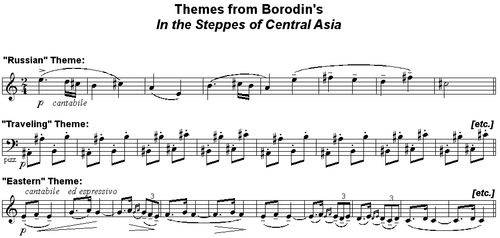- In the Steppes of Central Asia
-
On the Steppes of Central Asia (Russian: В средней Азии, V srednyeĭ Azii, literally In Central Asia) is the common English title for a "musical tableau" (or symphonic poem) by Alexander Borodin, composed in 1880.
The work was originally intended to be presented as one of several tableaux vivants to celebrate the silver anniversary of the reign of Alexander II of Russia, who had done much to expand the Russian Empire eastward. The intended production never occurred, due to Alexander II's assassination that year, but the work itself became, and has remained, a concert favorite ever since its first concert performance, on 8 April 1880 (Old style) in St. Petersburg by the orchestra of the Russian Opera under the conductorship of Nikolai Rimsky-Korsakov.[1] The work is dedicated to Franz Liszt.
This orchestral work idyllically depicts an interaction of Russians and Asians in the steppe lands of the Caucasus. A caravan of Central Asians is crossing the desert under the protection of Russian troops. The opening theme, representing the Russians, is heard first (see chart of themes below); then we hear the haunting strains of an ornamented eastern melody on English horn, representing the Asians. These two melodies eventually are combined contrapuntally. Amidst these two ethnic melodies is heard a "traveling" theme in pizzicato that represents the plodding hoofs of the horses and camels. At the end only the Russian theme is heard.
In popular culture
- This piece of music was used in the 1921 silent film The Sheik, along with the Bacchanale from Camille Saint-Saëns's Samson et Delilah in order to depict the Arabic nature of the film.
- In the Ladybird Books cassette tape of The Secret Garden, In the Steppes of Central Asia is used as a musical theme, presumably to evoke the Indian birthplace of the protagonist.
- The melody from "The Eastern Theme" was later used for "The Sands of Time", the first song in the 1953 Broadway Musical, "Kismet", which was based on Borodin's music.
- This piece of music was also used as the theme music to the extremely popular TV show "RPA" in Australia. This TV show was about Royal Prince Alfred Hospital in Camperdown, NSW, where a myriad of medical staff performed miracles on patients and viewers were invited to watch the progression from their initial illness through to their recovery. Probably some of the most famous episodes were surrounding Professor Chris O'Brien (RIP). Also starring was the prominent Dr. Farrager from the Conference and Business Centre.
References
- ^ Dianin, Serge. Borodin. Trans. from the Russian by Robert Lord. Oxford Univ. Press, 1967; rpt. Westport, Conn.: Greenwoood Press, 1980, pp. 113-114, 225-228.
External links
- In the Steppes of Central Asia: Free scores at the International Music Score Library Project.
- Music in film «Moscow clad in snow», 00:07:22, 1908 on YouTube

This article about a classical composition is a stub. You can help Wikipedia by expanding it.

